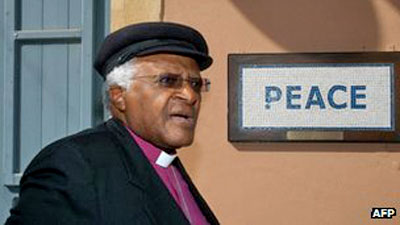
2 September 2012
from
BBC
Website

Archbishop Desmond
Tutu
has been a long time critic of the war in Iraq
Tony Blair and
George W Bush should be taken to
the International Criminal Court in The Hague over the Iraq war,
Archbishop Desmond Tutu has said.
Writing in the UK's Observer
newspaper, he accused the former leaders of lying about weapons of mass
destruction.
The Iraq military campaign had made the world
more unstable,
"than any other conflict in history", he
said.
Mr Blair responded by saying
"this is the same argument we have had many
times with nothing new to say".
'Playground bullies'
Earlier this week, Archbishop Tutu, a veteran
peace campaigner who won the Nobel Peace Prize in 1984 in recognition of his
campaign against apartheid, pulled out of a leadership summit in
Johannesburg because he refused to share a platform with Mr Blair.
The former Archbishop of Cape Town said the US-
and UK-led action launched against Saddam's regime in 2003 had brought about
conditions for the civil war in Syria and a possible Middle East conflict
involving Iran.
"The then leaders of the United States [Mr
Bush] and Great Britain [Mr Blair] fabricated the grounds to behave like
playground bullies and drive us further apart. They have driven us to
the edge of a precipice where we now stand - with the spectre of Syria
and Iran before us," he said.
He added:
"The question is not whether Saddam Hussein
was good or bad or how many of his people he massacred. The point is
that Mr Bush and Mr Blair should not have allowed themselves to stoop to
his immoral level."
Archbishop Tutu said the death toll as a result
of military action in Iraq since 2003 was grounds for Mr Blair and Mr Bush
to be tried in The Hague. But he said different standards appeared to be
applied to Western leaders.
He said:
"On these grounds, alone, in a consistent
world, those responsible should be treading the same path as some of
their African and Asian peers who have been made to answer for their
actions in The Hague."
In response to Sunday's article, Mr Blair issued
a strongly worded defence of his decisions.
He said:
"To repeat the old canard that we lied about
the intelligence [on weapons of mass destruction] is completely wrong as
every single independent analysis of the evidence has shown."
'Chemical weapons'
"And to say that the fact that Saddam
massacred hundreds of thousands of his citizens is irrelevant to the
morality of removing him is bizarre.
"We have just had the memorials both of the
Halabja massacre, where thousands of people were murdered in one day by
Saddam's use of chemical weapons, and that of the Iran-Iraq war where
casualties numbered up to a million, including many killed by chemical
weapons.
"In addition, his slaughter of his political
opponents, the treatment of the Marsh Arabs and the systematic torture
of his people make the case for removing him morally strong. But the
basis of action was as stated at the time."
He added:
"In short this is the same argument we have
had many times with nothing new to say. But surely in a healthy
democracy people can agree to disagree.
"I would also point out that despite the
problems, Iraq today has an economy three times or more in size, with
child mortality rate cut by a third of what it was. And with investment
hugely increased in places like Basra."
Human rights lawyer Sir Geoffrey Bindman
told BBC Radio 4 the Iraq war was an illegal aggressive war.
He said a war crimes trial,
"should be and could be held on the basis a
crime of aggression has been committed and the crime of aggression was
starting the war.
"It's now almost certain that the war was
illegal because it breached the UN Charter provisions which say that all
member of the United Nations must refrain from the use of force against
the territorial integrity or political independence of any state."
Former Lord Chancellor Lord Falconer said
he disagreed with Desmond Tutu and Sir Geoffrey.
"The use of force is allowed among other
reasons when the United Nations authorizes it, and
the United Nations
authorized it by
resolution 1441.
"The dispute between Geoffrey and myself
would be whether or not resolution 1441 did or did not authorize war and
we say that it did.
"Even that disagreement doesn't give rise to
the possibility of war crimes, the world has very impressively over the
last two decades come together and identified what they mean by war
crimes; genocide, ethnic cleansing, torture and in a variety of ways
brought people to trial for that"

